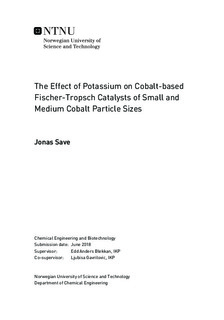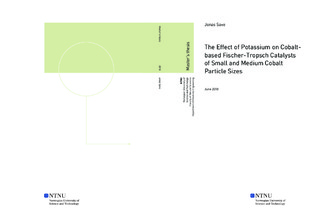| dc.description.abstract | The effect of potassium on a 20 wt.% Co - 0.5 wt.% Re/-Al2O3 catalyst consisting of small
and medium cobalt particle sizes were investigated. The particle sizes were adjusted by
using different mixtures of ethylene glycol (EG) and deionized water in the impregnation
solution. The mass percentages 40-, 60-, 80-, 95-, and 100 %, of water over EG were prepared. The catalysts were initially denoted CoRe40, CoRe60, CoRe80(15ppm), CoRe95 and CoRe100(6ppm). As CoRe40 and CoRe60 showed similar reduction temperatures in TPR measurements, similar Co- and Co3O4 particle size estimates in H2-chemisorption and XRD measurements as CoRe80(15ppm), and as time was limited, they were not studied in terms of catalytic activity. The catalysts CoRe95, CoRe100(68ppm)-SiO2 and CoRe100(526ppm)-SiO2 were not chosen for further activity measurements either mainly due to time limitations.
Decreased cobalt particle sizes lead to a clear decrease in catalytic activity, C5+-selectivity, and an increase in CH4- and CO2-selectivity. These effects are ascribed to the lower reducibility of smaller cobalt particles, induced by metal-support interactions. Potassium contaminations lead to severely decreased activities, possibly increased C5-selectivities, and a clear decrease in CH4- and CO2-selectivities. These effects are harder to explain but could be because of the more specific positioning of mobile potassium species on active FT sites, or of electronic effects induced by potassium. No difference was seen in the effect of potassium on small particles compared to on medium particles. Therefore, as the hypothesis put forth at the beginning of this work was that smaller particles would be more severely deactivated by potassium is disproved. This could indicate that the important sites for FT activity are not step, kink, or edge sites, but perhaps terrace sites. | |

